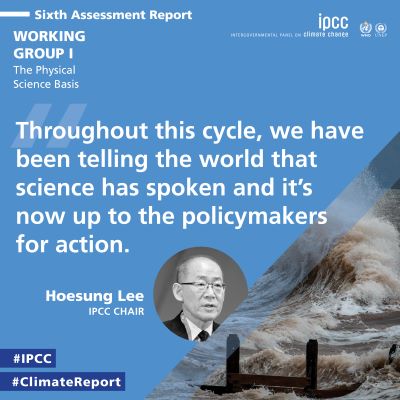 Let's start off with this: What's the deal with this IPCC report I keep hearing about? The IPCC is the Intergovernmental Panel on Climate Change. Basically, some of the good science-based folks at the United Nations assess what's happening to the world regarding climate change.
Let's start off with this: What's the deal with this IPCC report I keep hearing about? The IPCC is the Intergovernmental Panel on Climate Change. Basically, some of the good science-based folks at the United Nations assess what's happening to the world regarding climate change.
... And those good folks just released their latest findings. Spoiler alert: It's a 1,300 page report and, tl;dr, the state of our planet is not looking good - but you knew that already. The report is another wake-up call to the world, and another opportunity for us to demand urgent action by decisionmakers.
Yes, climate grief is real and it’s a totally valid and appropriate (I'll admit, I recently sobbed pretty hard through the first half of David Attenborough's latest book and shut myself off from the world for a bit). But don’t get stuck in that place. The best remedy for climate grief is action. Now is the time for courage as we double down on our efforts to save the future.
For this post, I just wanted to gather and share some responses to the IPCC report from our Sacramento community members and 350 Sacramento supporters. Click on the individual names to expand their responses.
also, tho, the fundamental systemic changes that are optimal don't seem to be available through the usual litany of individual environmental good deeds.
i don't know how to bridge that gap between societal and individual, but it's super important.
A surprise to me in the report was the massive effect of methane. Fully one-third of global warming is coming from methane! (see report summary, Fig. SPM.2).
This is both alarming and represents a big opportunity. We need to reduce warming fast and it's very difficult to do this by fighting CO2, because CO2 has such a long lifetime in the atmosphere (many decades to centuries). Methane only persists something like 9 years. See graph below (from Howarth 2015 Energy Science & Engineering v. 2. I believe BC is black carbon, also a sleeper but maybe harder to control because some of it is from wildfires.)
Note that reducing methane (CH4) and BC can keep global temperature rise below 1.5C (an important goal) for thirty years, well before CO2 reduction efforts yield significant results.
Plus, no one is really _clamoring_ for atmospheric methane releases like they are for CO2 roaring out their car and truck tailpipes. So it's an easy ask, except from fossil and pipeline companies. Some releases are unintentional, careless leaks or poor construction or maintenance; quite a lot is intentionally blown off for various operational 'purposes'. Hal Thomas knows lots about this. I suggest 350 increase its targeting and pressure specifically on methane releases and methane regulation.
Fortunately, the bipartisan bill passed by the Senate recently would provide needed funds for capping wells, etc.
Yes, BC is black carbon something that has a much shorter atmospheric lifetime than methane, so also something needing more focus.
Quote from MotherJones:
“Methane is the next crucial, fast, climate-stabilization prize,” said Rick Duke, senior director and White House liaison for the Special Presidential Envoy for Climate Change, at a press conference on Monday following the release of the IPCC report. “There's simply nothing that comes close for securing our near-term climate future, buying us crucial time to decarbonize energy and to develop advanced options like negative-emissions technologies.” “Cutting methane emissions is the single fastest, most effective way there is to slow the rate of warming right now,” agreed Ilissa Ocko, senior climate scientist at the Environmental Defense Fund.


